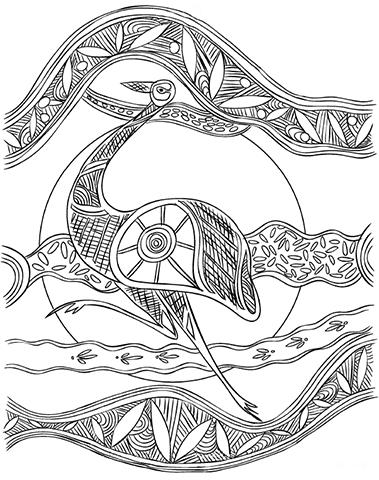And Then Came the Sun: A Bird Story
Another Aboriginal myth from Australia about how the world came to be, this one stars some exclusively Australian birds—the emu, the Australian crane (also called the native companion) and the kookaburra.
In the time before time, there was no sun and all the world lived by the kindness of the moon and its silvery light. There were no human beings in the world as yet, just birds and animals.
The emu was then a bird with long wings that lived in the sky. Once, hearing a big commotion down below on earth, she looked from among the clouds to see what the excitement was all about.
She saw a group of birds gathered near a lagoon, having the time of their lives. The bellbirds were singing in voices that sounded like the tinkling of silver bells. The native companion, always a graceful dancer, was daintily displaying her skills on the grass. Up on an old gum tree sat a kookaburra, laughing at all the merrymaking.
Fascinated by the dancing, the emu flew down from the sky for she wanted to learn how to dance too. ‘That was beautiful, what you did on the grass,’ she told the native companion. ‘Can you teach me as well?’
The native companion was a wicked bird. She smiled at the emu. ‘Of course, my dear, I can teach you but you have a problem. Your wings, they are just too big for dancing. I’m afraid you’ll have to trim them if you want to dance.’

The other native companions hid their smiles. The emu, foolish bird, did not think about how she would fly back home without her long wings. At once she agreed to let them trim her wings. The native companion trimmed her wings really, really short. When she was finished, all the other native companions, who had been carefully concealing their long wings folded behind their backs, opened them out and flew away, leaving the poor emu alone.
The emu, sadder and wiser, realized that she could never ever fly back to her home in the sky. She had no choice but to remain on earth. This is why emus can never fly, but they can run pretty fast, if that is any consolation.
Putting the unfortunate episode behind her, the emu began life anew on earth. Soon she was a proud mother with a large brood of chicks. One day, when she was walking by with her chicks in tow, the wicked native companion spotted her. The native companion had her own brood with her as well but she hid them all, save one, in a bush and then approached the emu.
‘Poor dear, how can you manage to raise so many chicks? Finding food for all of them must kill you. Look at me, I just have one to take care of. You must get rid of them all or it will be the end of you!’
Listening to the soft, gentle voice of the cunning crane, the emu once again fell for the trick and destroyed all her chicks. The smug native companion now called out in a sweet voice to her own chicks, ‘Geralka, beralka, geralka, beralka!’ And the little fluffy birds came running out of the bush to greet their mother. Needless to say, the poor emu was heartbroken and began to grieve over her thoughtless act.
However, the native companion received some punishment for this cruelty. When she turned her long neck to beckon her chicks, she twisted it and as a result, her voice became hoarse and jarring from then on.
When the next season came, the emu had a nest full of eggs. But when the native companion came upon it, she trampled and destroyed them all, save one. At that moment the emu came upon the scene and there was a tussle between the two birds for the last egg. But sadly, once again for the emu, the native companion flung it across the sky. The egg broke against a pile of firewood that the sky spirits had piled up and the golden yolk burst into flame. All the world was aglow in that fire. The animals and birds below looked up in wonder. It lit their world and warmed them in the cold.
The Great Spirit in the sky thought that something good should come from this entire tragedy and decided that the sky spirits would light a fire in the sky every day so that the earth would have light and warmth.
The sky spirits called the kookaburra. ‘We have a job for you,’ they told the bird, who could laugh. ‘Every morning you have to wake your folks below with your laugh for that’s when we’ll light the sky fire.’ The sporting bird agreed. And so every day begins with the kookaburra’s laughter, ‘Goor . . . gour ga ga . . . Goor . . . gour gag a . . .’ and all the world awakes to a new day under the sun.
